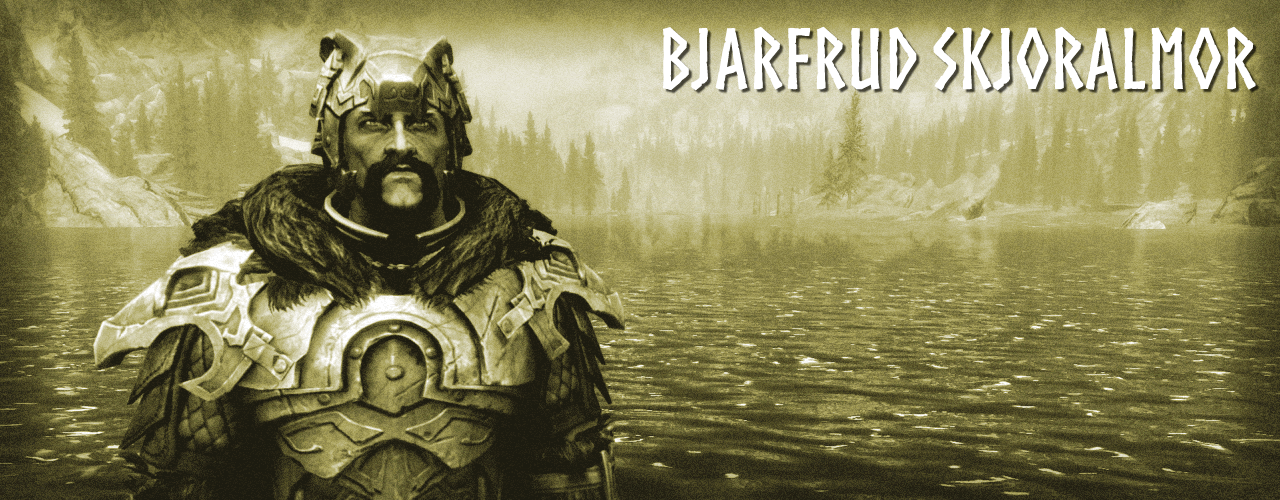| Book Information | |||
|---|---|---|---|
| Up | The Seventeen and One Monarchs of the Ysgramor Dynasty | ||
| Prev. | Hrogar Brass-Bane | Next | Vundheim of Whiterun |
by High Chronicler Valerius of Winterhold
A history of Skyrim's early High Kings
- Prior to his rule, Jarl Bjarfrud was a well established warrior and ruler. In 1E 76, during the reign of King Hrogar Brass-Bane, he led three campaigns into the forests of modern-day Falkreath Hold to drive out the Orcish settlers who had taken root. Believed to be remnants of King Hjornskar's pogrom some fifteen years prior, they were either killed or fled south into the Jerall Mountains. To mark his victory, Bjarfrud established the town of Falkreath and ruled as its Jarl for the next decade.
- When kingship was thrust upon Bjarfrud after the self-exile of King Hrogar, he begrudgingly accepted. The official histories speak of his reluctance to take the throne as a gesture of solidarity towards Hrogar, but numerous poetic eddas humorously claim the real reason was because he simply didn't wish to leave the warm forests of Falkreath for frost-ridden Windhelm.
The White Spire O' the South
- Although much of Bjarfrud's eleven year reign was dealing with the Velothi Uprising in Morrowind or stamping out the last remaining dragon cultists in the south, no doubt his most notable act as High King was his ill-fated campaign into Cyrodiil. This particular campaign had been set in motion ever since King Einarth sighted the "White Spire O' the South" atop Mount Trolhetta twenty years prior. Leading the charge, King Bjarfrud marched his men south through a narrow mountain pass with relative ease and the emerged into northern Cyrodiil, or Cyrod as it was known under the Ayleids. Much of the north was a snowy wasteland, but Bjarfrud's scouts had identified an Ayleid city near the pass. Rielle was vast city ruled by a powerful sorcerer-king named magister Zenzizen Zizenzic, who saw the approaching army and was well prepared.
- The foothills of the Jerall Mountains was the stage for a great battle that raged for three days and nights. The Annals report that both sides suffered heavy losses as Voice masters traded blows with Ayleid sorcery. Ultimately, King Bjarfrud's forces were victorious, but at a great cost. Bjarfrud himself was slain on the third day fighting a colossal Daedric creature. News of his death was said to have inspired an unstoppable battle-rage within his army, and the remaining Ayleid army fled the field of battle.
Aftermath
- Bjarfrud's surviving army was ordered back to Skyrim to recover and regroup, but his soldiers refused to dishonor their slain comrades by leaving their corpses on elven soil. In an effort to give the fallen an honorable burial, Jarl Solaf Skjoralmor of Falkreath arranged for his own elite horsemen to shepherd numerous carriages and wagons, and bring the dead back to his town's cemetery. This marked the first of many mass burials that Falkreath would host over the following eras. The Jarl's horsemen went on to form the distinguished Ilinalta Outriders - an elite branch of cavalry who swore an oath to guard the mountain passes of the Jeralls.
- King Bjarfrud himself, who always considered Falkreath his home, was interred in the city's Hall of the Dead. The famed royal bard, Brea Silvertongue, wrote for him an epitaph commemorating what King Bjarfrud considered his fondest memory:
-
- Here lies the stone upon which this city was found,
-
- Took the shape of a man whose deeds saw him crowned.
-
- Thrice he drove the beastly hosts from their heathen wood,
-
- So he hewed it down and planted this town,
-
- On the very spot that he stood.
- His last will and testament decreed that only his descendants would be granted the right to rule Falkreath and her environs, which they did until the mid-second Era. In 1E 99, the Vulpine Scepter was passed onto his nephew and Harbinger of the Companions: Vundheim of Whiterun.
